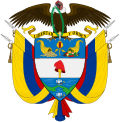| This article is part of a series on the |
| Politics of Colombia |
|---|
 |
Congresisonal elections were held in Colombia on 4 April 1937 to elect the Chamber of Representatives. [1] The Liberal Party was the only party to contest the elections, and received 100% of the vote. [2]